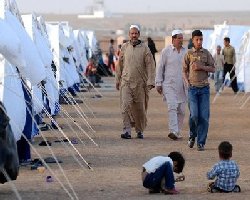The UN has said that almost 40,000 people have fled fighting in Libya's Western Mountains region in the past month.
Thousands of ethnic Berbers from Libya fled into Tunisia after a brief hiatus in their exodus last week because of fighting between Gaddafi troops and opposition forces for control of a border crossing point.
"This past weekend, more than 8,000 people, most of them ethnic Berbers, arrived in Dehiba in southern Tunisia. Most are women and children," a UNHCR spokesperson said on Tuesday.
UNHCR staff in Dehiba said the situation of the refugees was being made worse by a violent sandstorm that has battered the area, destroying hundreds of tents and two huge portable warehouses.
UNHCR and its partners said they are struggling to maintain nearby camps.
Antonio Guterres, the UN High Commissioner for refugees, told Al Jazeera that the situation is rapidly getting worse for Libyan refugees.
"We have two hot spots - Misurata, where there is no humanitarian access and people are suffering enormously, and the border with Tunisia where there has been a lot of fighting for control of the border," he said.
"The situation is becoming extremely dramatic from a humanitarian point of view. The Tunisians have been extremely generous, sharing everything with Libyan refugees but it is extremely difficult to support this population."
Control of the Dehiba border crossing has changed hands over the past week as the fighting spilled onto Tunisian territory. Currently, the crossing is under opposition control.
Further fighting feared
Residents of Dehiba town told UNHCR staff they were worried about military activity across the border and feared further skirmishes.
Meanwhile, people have resumed fleeing Libya by sea to Italy after a 10-day break due to bad weather.
Some 3,200 people have arrived on the island of Lampedusa over the past five days, most of them originating from sub-Saharan Africa.
This brings the total number of irregular arrivals on Italian territory from Libya since March 26 to more than 8,100. Another 1,132 people have arrived in Malta on boats from Libya since mid-April.
The United Nations, Western powers and some Arab states accuse Libyan leader Muammar Gaddafi of ordering his security forces to kill thousands of civilians who rose up in protest against his four-decade rule.
Benghazi bomb blast
Meanwhile, a car bomb in the opposition stronghold of Benghazi lightly injured two people, doctors in the city said on Tuesday.
The explosion, the first of its kind in the city since the uprising against Gaddafi began in February, prompted anti-government demonstrators, some of them armed, to come out onto the streets, chanting anti-Gaddafi slogans and brandishing the weapons.
The explosion apparently blew out windows in a high-rise building near the Benghazi courthouse, which has served as the opposition headquarters.
Early on Wednesday, explosions were heard in eastern Tripoli after jets were heard flying over the city. NATO has been carrying out a series of air strikes against targets in the capital it says are part of Gaddafi's command and control structure.
PHOTO CAPTION
Refugees from Libya walk in a camp near the southern Dehiba border crossing, about 200 kms (125 miles) south of Ras Jdir in Tunisia, on April 25.
Source: Aljazeera.net

 Hajj virtues
Hajj virtues